Archive for the 'Board Game Review' Category
Posted by James (admin) on 2nd September 2012
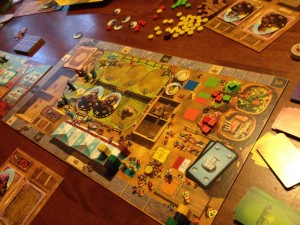 Dungeon Petz is by the same designer as Dungeon Lords and shares other traits like the same art style and same imp figures. However, Dungeon Petz is a totally separate game. During the game, players are trying to raise various strange creatures and score prestige points (PP) by having the best creatures in pet shows and by selling them too. Player with the most PPs at the end of 5 rounds wins.
Dungeon Petz is by the same designer as Dungeon Lords and shares other traits like the same art style and same imp figures. However, Dungeon Petz is a totally separate game. During the game, players are trying to raise various strange creatures and score prestige points (PP) by having the best creatures in pet shows and by selling them too. Player with the most PPs at the end of 5 rounds wins.
GAMEPLAY
Each player starts with a player board which has one basic cage on it and room for 3 more. Each round, players use their imps to get new pets, new cages, cage improvements, pet food, extra imps, as well as do a few other actions which I’ll mention later. The core mechanic for the game is worker placement as players use their imps to claim actions, but there is a nice twist to make it different to most worker placement games. In Dungeon Petz, players form their imps (and gold) into groups behind a screen. They then reveal their groups and the groups of the biggest size take their actions first. So, players can put all their imps in one basket so-to-speak to ensure they claim one action before anyone else, or they can put them in smaller groups to claim multiple actions but the smaller the group, the greater the risk that another player will have taken that action first. Read the rest of this entry »
Tags: board game news, Board Games, board gaming, Dungoen Petz
Posted in Board Game Review, Board Games, Dungeon Petz | No Comments »
Posted by James (admin) on 1st September 2012
K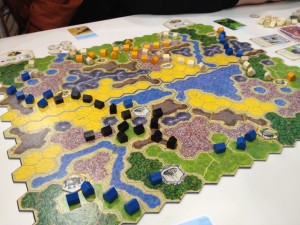 ingdom Builder is designed by the designer of Dominion and went on to win the coveted Spiel des Jahres award 2012. The game is relatively simple. Players score points at the end of the game based on where they have built their buildings based on criteria specified by 3 Kingdom Builder cards (randomly selected from 10). The board is created using 4 sections in any combination (randomly selected from 8).
ingdom Builder is designed by the designer of Dominion and went on to win the coveted Spiel des Jahres award 2012. The game is relatively simple. Players score points at the end of the game based on where they have built their buildings based on criteria specified by 3 Kingdom Builder cards (randomly selected from 10). The board is created using 4 sections in any combination (randomly selected from 8).
On their turn, a player has just one terrain card and they must place 3 of their buildings on unoccupied spaces on the board that match that terrain type. Buildings must be placed next to any of the player’s existing buildings, if possible; otherwise, they can be placed on any hexes of the matching terrain. If the player places any of their buildings next to one of the special locations on the board, they get to take one of the matching special action tiles.
As well as the mandatory action, players can use any special actions they have collected which allow a player to do things like moving buildings and building an extra buildings. The special actions can each be used once per turn. Read the rest of this entry »
Tags: board game news, Board Games, board gaming, Kingdom Builder, Spiel des Jahres
Posted in Board Game Review, Board Games, Kingdom Builder | No Comments »
Posted by James (admin) on 30th August 2012
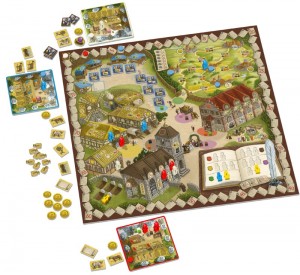
I read the rules for Village when I was at Essen last year and as soon as I saw the meeple laying in the history book or in the unmarked graves I knew I wanted to play it. I pre-ordered it and I’m glad I did as I’ve really enjoyed every game I’ve played of it so far. More recently it rightly won the complex Spiel des Jahres award too. The reason it’s a great game is due to an interesting mix of some unusual game mechanics – none are complex but there’s lots of variety – so I shall attempt to summarise the main elements.
GAME OVERVIEW
In Village, players use their villagers (meeple) to do various tasks and the goal is to earn the most respect (victory points – VPs). There are two key mechanisms in the game – time and actions.
Time
The first core mechanism is time – many actions use up time which each player tracks with a marker around the edge of their player board (their farm). Quite often, the player has a choice to spend time or use resources to do things like making a plough, but many options require time like travelling, or training a craftsman. When the time marker completes a circuit of a player’s board, one of the eldest villagers of that player passes away and is either placed into the history books or in an unmarked grave (more on that later). Read the rest of this entry »
Tags: board game news, Board Games, board gaming, Essen, SdJ, Spiel 11, Spiel des Jahres, Village
Posted in Board Game Review, Board Games, Essen Spiel 11, Village | No Comments »
Posted by James (admin) on 28th August 2012
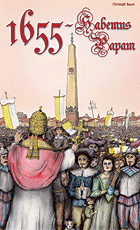 The theme of selecting a new pope may not be as broadly inspiring as that of pirates or city building, but don’t let this put you off as 1655 Habemus Papum is a surprisingly great game.
The theme of selecting a new pope may not be as broadly inspiring as that of pirates or city building, but don’t let this put you off as 1655 Habemus Papum is a surprisingly great game.
Essentially, it’s a bidding game as players blind (simultaneous) bid gems to determine in what order the players will take one of the 4 cards on offer each round. The goal is to be voted pope at the end of the game which you do by collecting votes. You start with a few gems which have a strict hierarchy: diamonds, rubies, sapphires and amber in descending order.
Each round 4 cards are on offer – one from each of the 3 decks plus the start player card. Players secretly put 0-3 gems in their hand and simultaneously reveal. The player with the most gems (any colours) picks a card first, then the player with the next highest total of gems, etc. If players are tied on quantity of gems then the quality of the gems is compared – players compare their most valuable gem, then the next and so on. If players have bid identical gems then the person closest to the start player going clockwise wins the tie.
The cards are cardinals (which give votes and sometimes cash), actions (which let you do things like steal cardinals, or your best gem counts twice for one bid), and political cards (which let you get votes from the King depending upon how many King cards you have, or allow you to buy votes more cheaply at the end of the game depending upon how many of those cards you ave, etc.) The start card is very important too as not only does it mean you win ties but, even more importantly, you get 1 red, 1 blue and 1 yellow gem plus 1 cash – this is the ONLY way you can get more gems during the game. Note you can never get more diamonds. Read the rest of this entry »
Tags: 1655 Habeus Papum, board game news, Board Games, board gaming
Posted in 1655 Habemus Papum, Board Game Review, Board Games | No Comments »
Posted by James (admin) on 24th November 2011
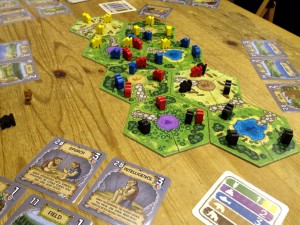 In Power Grid: The First Sparks, players have stone age clans trying to expand into new areas. The First Sparks is a simplified (and differently themed) version of the very popular game Power Grid – I’ll talk about how the two compare at the end but will write this review from the point of view that you haven’t played, or know, Power Grid.
In Power Grid: The First Sparks, players have stone age clans trying to expand into new areas. The First Sparks is a simplified (and differently themed) version of the very popular game Power Grid – I’ll talk about how the two compare at the end but will write this review from the point of view that you haven’t played, or know, Power Grid.
THE GAME
During the game, players need food to feed their clans so they can expand into new territories. Food is gained by clans in areas using tools and knowledge. Food comes in various forms and each token of each type is worth different amounts of food (crops=1, berries=2, fish=3, bears=3, mammoths=4). The board is a landscape of hex zones each with a food type in the centre and split into 3 areas. Read the rest of this entry »
Tags: board game news, Board Games, board gaming, Essen, Power Grid The First Sparks, Spiel 11, Spiel 2011
Posted in Board Game Review, Board Games, Essen Spiel 11, Power Grid The First Sparks | No Comments »
Posted by James (admin) on 22nd November 2011
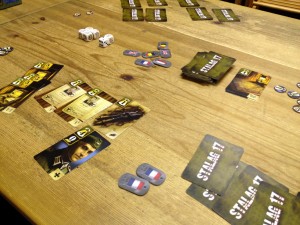 In Stalag 17, players are prisoners of war assembling their escape plans – the first to have all 3 of their POWs escape wins. At the start of each escape attempt, some dice are rolled which determines what equipment (food, uniforms, maps,etc.) will be required for this escape attempt as well as a normal dice (1-6) which is the runaway score that a player needs to equal or beat too.
In Stalag 17, players are prisoners of war assembling their escape plans – the first to have all 3 of their POWs escape wins. At the start of each escape attempt, some dice are rolled which determines what equipment (food, uniforms, maps,etc.) will be required for this escape attempt as well as a normal dice (1-6) which is the runaway score that a player needs to equal or beat too.
Players take turns taking, discarding and placing cards. One their turn a player can:
- Play 1 card from their hand in front of them face-down (taking a replacement card from the draw deck)
- Draw 2 cards (both from the draw deck or 1 from the draw deck and 1 from the discard pile)
- Discard: any 1 card, or 3+ cards that are the same, or 5+ cards that are all different
- Escape Read the rest of this entry »
Tags: board game news, Board Games, board gaming, Essen, Spiel 11, Spiel 2011, Stalag 17
Posted in Board Game Review, Board Games, Essen Spiel 11, Stalag 17 | No Comments »
Posted by James (admin) on 21st November 2011
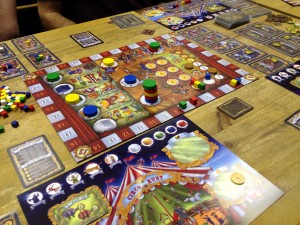 In Drum Roll, players are putting on circus shows with the winner scoring the most prestige points (PPs) after three performances.
In Drum Roll, players are putting on circus shows with the winner scoring the most prestige points (PPs) after three performances.
To score PPs, players need to hire performers (which costs cash) and give them the enough equipment, costume, etc. (represented by colour cubes) so that they can give great performances. Each performer can give a 1-, 2- or 3-star performance; however, each performer needs a specific colour cube for each level of performance – so a 3-star performance requires 3 cubes of the exact colours. Each of the 5 types of performer give different benefits (gaining cubes, generating cash, reducing salaries, etc.) and the better the performance, the better the ability. Instead of delivering their 3-star performance benefit though, the player can flip that performer’s card which earns PPs (and reduces their salary each round) but means they player can not use their ability any longer. Read the rest of this entry »
Tags: board game news, Board Games, board gaming, Drum Roll, Essen, Spiel 11, Spiel 2011
Posted in Board Game Review, Board Games, Drum Roll, Essen Spiel 11 | No Comments »
Posted by James (admin) on 15th November 2011
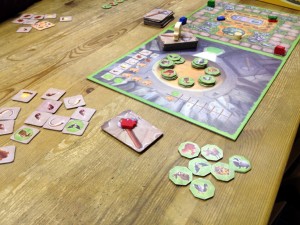 Not be confused with Krok Nik Douil’s game also called Mammut, this Mammut is a game by Queen Games. Players try to gather tiles which all score in different ways. This sounds very normal but the way the tiles are gathered is a very interesting mechanic delivering a funny and humorously evil game.
Not be confused with Krok Nik Douil’s game also called Mammut, this Mammut is a game by Queen Games. Players try to gather tiles which all score in different ways. This sounds very normal but the way the tiles are gathered is a very interesting mechanic delivering a funny and humorously evil game.
The game is played over several rounds – scoring occurs after each round and the player with the most victory points (VPs) wins. Each round 31 double-sided tiles are mixed up in a bag and then dumped onto the table and spread out. The tiles show fur, claws, axes, meat, fire and animals. Some tiles have question marks on them and these will only get turned over to reveal their actual value when scoring starts.
On your turn, you can either (a) take some (or all) of the tiles in the centre (if any remain), or (b) you can take all of another player’s tiles but you must put one of them back in the middle. Read the rest of this entry »
Tags: board game news, Board Games, board gaming, Essen, Mammut, Queen Games, Spiel 11, Spiel 2011
Posted in Board Game Review, Board Games, Essen Spiel 11, Mammut (Queen) | No Comments »
Posted by James (admin) on 8th November 2011
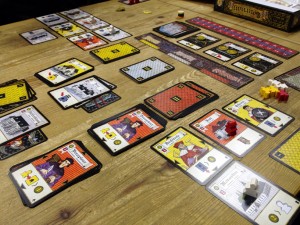 Tournay is a card-based game where players aim to score the most prestige points (PPs) by building their own town. It’s by the same designers as Troyes (which was why I pre-ordered a copy) but, whilst it uses the same art style as Troyes and a couple of similar-ish elements, Tournay is very different to Troyes and not the card game version of it at all.
Tournay is a card-based game where players aim to score the most prestige points (PPs) by building their own town. It’s by the same designers as Troyes (which was why I pre-ordered a copy) but, whilst it uses the same art style as Troyes and a couple of similar-ish elements, Tournay is very different to Troyes and not the card game version of it at all.
In the middle of the table are 9 decks of cards – levels 1, 2 & 3 in colours red, white and yellow. The cards are buildings and characters – buildings can be activated to use their abilities; whereas, characters have effects when buildings are placed or triggered in the same row/column as the character card. For example a character card may earn a player cash when they activate a white building. Whilst you can build over placed cards, as your town can only be 3×3 in size, it is plain from the start that you need to find a good balance between buildings and characters and place them so they have synergy. Read the rest of this entry »
Tags: board game news, Board Games, board gaming, Essen, Spiel 11, Spiel 2011, Tournay, Troyes
Posted in Board Game Review, Board Games, Essen Spiel 11, Tournay | No Comments »
Posted by James (admin) on 4th November 2011
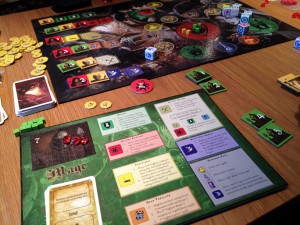 Dragon Rampage is a clever, dice-driven game by Richard Launius who has created games including Arkham Horror and Defenders of the Realm. Dragon Rampage though is a bit more light-hearted as players are running from a dragon’s lair with as much treasure as possible.
Dragon Rampage is a clever, dice-driven game by Richard Launius who has created games including Arkham Horror and Defenders of the Realm. Dragon Rampage though is a bit more light-hearted as players are running from a dragon’s lair with as much treasure as possible.
On their turn, a player rolls the 7 special dice in a way similar to Yahtzee as a player can use 2 re-rolls to re-roll as many or as few dice as they wish (apart from dragon results which are instantly locked). When the player stops rolling, they record how many of the 6 different results they scored. The round ends when all players have had a turn and each of the different results is evaluated. The players with the most of each result get a benefit. Read the rest of this entry »
Tags: board game news, Board Games, board gaming, Dragon Rampage, Eagle Games, Essen, Richard Launius, Spiel 11, Spiel 2011
Posted in Board Game Review, Board Games, Dragon Rampage, Essen Spiel 11 | No Comments »
 Dungeon Petz is by the same designer as Dungeon Lords and shares other traits like the same art style and same imp figures. However, Dungeon Petz is a totally separate game. During the game, players are trying to raise various strange creatures and score prestige points (PP) by having the best creatures in pet shows and by selling them too. Player with the most PPs at the end of 5 rounds wins.
Dungeon Petz is by the same designer as Dungeon Lords and shares other traits like the same art style and same imp figures. However, Dungeon Petz is a totally separate game. During the game, players are trying to raise various strange creatures and score prestige points (PP) by having the best creatures in pet shows and by selling them too. Player with the most PPs at the end of 5 rounds wins.



 The theme of selecting a new pope may not be as broadly inspiring as that of pirates or city building, but don’t let this put you off as 1655 Habemus Papum is a surprisingly great game.
The theme of selecting a new pope may not be as broadly inspiring as that of pirates or city building, but don’t let this put you off as 1655 Habemus Papum is a surprisingly great game.




